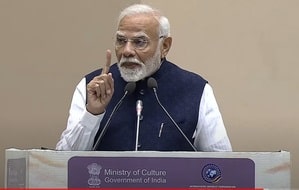Prime Minister Narendra Modi on Thursday attended the celebrations of International Abhidhamma Divas and recognition of Pali as a classical language at Vigyan Bhavan here, calling the new status of Pali a tribute to the enduring legacy of Lord Buddha.
Union Minister of Culture Gajendra Singh Shekhawat welcomed PM Modi by presenting him with the Dharmachakra symbol -- the 'Wheel of Dharma'. The Prime Minister also facilitated Buddhist monks during the event.
Starting his address with "Namo Buddha," PM Modi expressed his gratitude for being part of the event.
"This day reminds us that by compassion and goodwill, we can make the world a better place. In 2021, I had the privilege of attending a similar event in Kushinagar. Today, I feel honoured to continue my journey connected to Lord Buddha, which began at birth in Vadnagar, Gujarat—a prominent centre of the Buddhist religion. Living with these inspirations, I've experienced much about 'Dhamma' and the teachings of Buddhism," he said.
Reflecting on his experiences, the Prime Minister spoke of attending numerous global Buddhist events, from visiting Nepal, the birthplace of Lord Buddha, to unveiling his statue in Mongolia and participating in Vaishakh Samaroh in Sri Lanka.
Extending his best wishes to everyone on the occasion of Abhidhamma Divas, Sharad Purnima, and Valmiki Jayanti, PM Modi stressed the importance of recognising Pali as a classical language.
"This month, the Government of India made Pali a classical language, making today even more significant. Recognising Pali is a tribute to the great legacy of Lord Buddha," he said.
PM Modi further elaborated on the significance of the Abhidhamma and its connection to the Pali language.
"Abhidhamma is inherent in Dhamma. To grasp the deeper meaning of Dhamma, understanding Pali is crucial. Dhamma encompasses Lord Buddha's teachings and answers to the profound questions of human existence, guiding humanity toward peace and welfare," he said.
"The world draws inspiration from Lord Buddha's Dhamma, but sadly, Pali, the language in which his teachings are embedded, has faded from everyday use. Language is not merely a communication tool; it is the soul of civilisation and culture. Keeping Pali alive is essential to preserve Buddha's teachings in their original form, and this is our responsibility," he added.
PM Modi expressed gratitude that the government has fulfilled this responsibility, calling it a humble attempt to honour the wishes of Lord Buddha's millions of followers. "I congratulate all of you on this achievement," he said.
The Prime Minister also mentioned the future developmental works, focusing on connecting and promoting the principles of Buddhism across the world. This also includes the construction of an airport in Kushinagar.
Abhidhamma Divas commemorates Lord Buddha's descent from the celestial realm.
With the recent recognition of Pali as a classical language, this year's celebrations hold special significance, as Buddha's teachings on Abhidhamma are preserved in Pali.
The International Abhidhamma Divas celebration, organised by the Central government and the International Buddhist Confederation, saw participation from academicians and monks from 14 countries, along with young experts on Buddha Dhamma from various Indian universities.
On October 3, the Union Cabinet, chaired by PM Modi, conferred Classical Language status to Marathi, Pali, Prakrit, Assamese, and Bengali. The recognition of these languages strengthens India's rich cultural heritage, encapsulating the essence of each community's historical and cultural contributions.
Union Minister Ashwini Vaishnaw had announced the approval, saying, "PM Modi has always focused on Indian languages. Today, Marathi, Pali, Prakrit, Assamese, and Bengali have been recognised as classical languages."
These languages join Tamil, Sanskrit, Telugu, Kannada, Malayalam, and Odia, which had already received Classical Language status. The designation of Classical Languages, established in 2004, honours languages with high antiquity, valuable literary traditions, and a distinct identity from their modern counterparts.
A Linguistic Experts Committee (LEC) was formed by the Ministry of Culture under the Sahitya Akademi in November 2004 to assess proposed languages for classical status. In 2005, the criteria were updated to include a recorded history of 1,500-2,000 years, a body of ancient literature, an original literary tradition, and a distinction between classical and modern forms.




New Urban Community Health Centre to reduce patients rush in GBP Hospital: CM Dr Manik Saha
Chief Minister Dr Manik Saha on Thursday laid foundation stone of 50-bed Urban Community Health Center here at Agartala and said that the present government is working diligently to improve health infrastructure and services in the state.
Govt determined to develop sports infrastructure in Tripura: CM Dr Manik Saha
Chief Minister Dr Manik Saha on Thursday inaugurated football turf, athletics track and hockey ground here at Agartala Dasarath Deb Sports Complex at Badharghat and said that the government is determined to develop facilities and platform for sports persons in the state.
Mistake that benefits no one: World leaders react to Trump's 'reciprocal tariffs'
As US President Donald Trump signed an executive order on the so-called "reciprocal tariffs," the world reacted sharply against the decision, with some calling it a "mistake that benefits no one" while others called it a violation of Washington's obligations under the World Trade Organization (WTO).
Indian pharmaceutical exports get reprieve from Trump’s reciprocal tariffs
Because of the importance of India’s pharmaceuticals to US healthcare, those exports will get a reprieve from President Donald Trump’s reciprocal tariffs, according to the White House.
India stands less impacted by Trump tariffs than global peers: Industry
As US President Donald Trump announced reciprocal tariffs on dozens of countries, including India, industry experts said on Thursday that it appears India's export competitiveness to the US market stands far less impacted on a relative basis compared to global peers.
IAF pilot killed, another critical as Jaguar fighter jet crashes in Gujarat
An Indian Air Force (IAF) pilot lost his life, while another sustained critical injuries after their two-seater Jaguar fighter jet crashed near Gujarat's Jamnagar Airfield, the IAF confirmed on Thursday.
PM Modi emplanes for Thailand; to attend BIMSTEC summit
Prime Minister Narendra Modi on Thursday emplaned for Thailand on a state visit to attend the 6th BIMSTEC Summit, with his visit also set to bolster bilateral relations between New Delhi and Bangkok.
Bhavan’s Little Learners celebrate annual programme
The Bhavan’s Little Learners, Bordowali celebrated annual programme and organised prize distribution ceremony here at Agartala Rabindra Satabarshiki Bhavan on Wednesday.